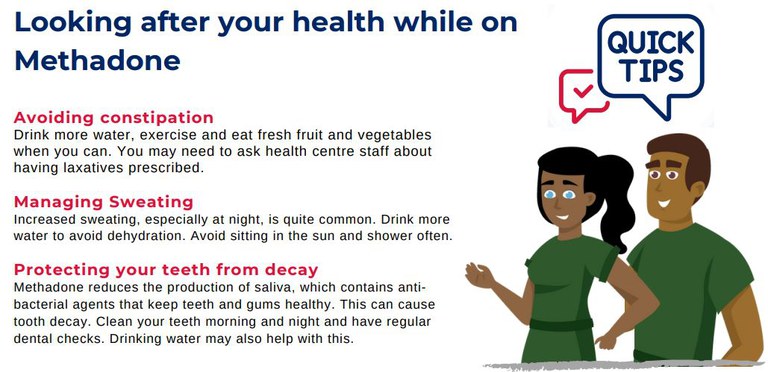Opioid Agonist Treatment (OAT) and Methadone in custody
What is Opioid Agonist Treatment?
- Opioid Agonist Treatment (OAT), is an effective treatment for addiction to opioids like heroin or methadone.
- It was used to be called OST, it's the same program, the language has just changed.
- The longer you stay on OAT, the more likely you are to stop using.
- All people entering custody on Methadone will be continued on treatment unless there is a medical or health reason why they should not.
What to do if you have an opioid use disorder and want to start OAT?
- Talk to a nurse about different treatment options and how you can reduce the harm of drug use.
- You will not be able to start Methadone in custody, only people who are on methadone in the community are able to have it continued
- You may be suitable for something different called depot buprenorphine treatment.
- Read the Depot Buprenorphine (Buvidal) in Custody flyer for more information.
- Talk with the Services and Programs Officer (SAPO) about counselling services and special programs offered by Corrective Services NSW.
Before you continue your Methadone treatment in custody, you need to agree to OAT treatment
- You need to sign an OAT agreement before you can continue treatment.
- The agreement explains your rights and responsibilities while on the program.
- Please make sure you understand the information before signing.
- If you don’t understand, ask the nurse to explain it to you.
Worried about your treatment?
If you have any worries about your treatment, talk with the Drug and Alcohol nurse or the Nursing Unit Manager at your health centre.
You can also call the Justice Health Patient Health Enquiry Line (Option 5) using the yard phone.
If you have a health problem that you don’t think is being sorted out, ask to speak with the Nursing Unit Manager at your centre.
If your problem is unresolved, you can write to Justice Health NSW's Chief Executive. Health staff in your centre can give you the address. You can also ring the Corrective Services NSW Support Line (option 2 from the yard phone), who will pass it on to relevant Justice Health NSW staff.
Good things about Methadone treatment
- Reduces cravings and withdrawal symptoms
- Costs much less than supporting an opioid drug habit
- Reduces the risk of HIV or hepatitis C infection
- Helps you lead a healthier lifestyle
- Helps you keep, or get, a job
Not so good things about Methadone treatment
- You need to attend the health centre for daily dosing
- There may be health side effects
- You are still dependent on a drug
- Methadone can be dangerous or cause death if not used right (especially for children)
- Travel and holidays can be hard to arrange
Common side effects from Methadone treatment
- Sweating
- Constipation
- Aching muscles and joints
- Tooth decay
- Lowered sex drive
- For women, irregular periods
Important information when on OAT
- You put yourself and others at risk if you do not take your dose the way you should, or divert your OAT medication. Your treatment will be stopped if you do not comply with treatment, divert, or try to divert your medication.
- Be careful driving or using heavy machinery in the 3 to 5 days after any Methadone dose increase.
- The nurses cannot give you your Methadone dose if you are intoxicated.
- Taking other drugs such as heroin, alcohol or pills (e.g. Valium or Xanax) with your Methadone can cause overdose and death.

Continuing Methadone treatment on release
- Tell the nurse six weeks before you are released so they can organise your treatment in the community.
- Your prescription will be sent to the community clinic directly from the health centre before your release, and it will be valid for three weeks.
- Your Methadone prescriptions cannot be extended once you are released.
- It’s important you find a health service in the community that can prescribe Methadone when you get out, and before your script runs out.
Useful contacts on release
Alcohol Drug Information Service (ADIS) NSW: Call 1800 250 015 (free call)
Opioid Treatment Line: Call 1800 642 428 (free call)
What to do if you are unexpectedly released from custody
If you are unexpectedly released from a public correctional centre and need help to arrange dosing in the community:
Monday to Friday 8am and 4pm: Call (02) 9700 2101.
Weekends and public holidays: Go to the clinic you attended before you came into custody, or the nearest dosing clinic, and tell them you have been released from custody.
If you are unexpectedly released from a private correctional centre, and need help to arrange dosing in the community:
Call the health staff at that centre to arrange the prescription for you so you can continue Methadone in the community.

